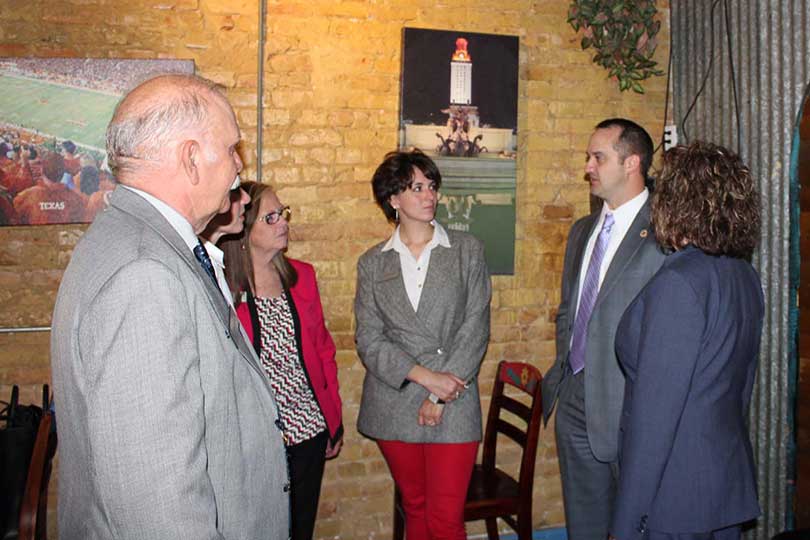By Shala Watson
Multimedia Writer
Texas farmers and ranchers took agriculture beyond the fence to the state’s Capitol during a recent visit.
Texas Farm Bureau’s (TFB) AgLead XIII and FarmLead VI discussed agricultural-related issues—ag lien, taxes, eminent domain, land use regulation, water rights and more—with elected officials during a four-day trip in late April.
The groups met with Reps. Mary Gonzalez, Kyle Kacal, DeWayne Burns and Ernest Bailes, among others.
“All the legislators were very positive and provided a significant amount of quality time one-on-one to get to know each other and develop those relationships on a more personal level,” Molly Smith, AgLead class member, said. “They all do seem to care a great deal about agriculture.”
Smith runs a commercial cow-calf operation in Brown County. Wild pigs were another issue discussed during the visit. Smith shared her personal testimony on how the invasive species has caused destruction to her land and property.
“Not everyone understands the challenges that the nuisance animals cause—tearing up land, tearing up crop land, contaminating water and transfer of disease,” Smith said. “Discussing that with someone who is from an urban area can sometimes have its challenges, but yet it’s a concern for all farmers and ranchers that needs to be shared with our legislators.”
Putting a face behind the name and making personal connections with the legislators can also have a greater impact on issues in the future.
“It’s good to call. It’s good to write letters, if that’s all you can do,” FarmLead class member Peggy Matli said. “But going there in person and having that personal connection has to make a big difference in what their thoughts are going to be down the line.”
Being proactive is critical for the success of agriculture now and in the future, members of the group noted.
“It’s our job as farmers and ranchers to bring out the issues and show our support,” said AgLead member Bennie Whitworth, a Rusk County rancher and hay producer. “These issues affect us, which is ultimately going to affect the rest of the public because that’s where their food comes from.”
This trip also provided the opportunity for Texas farmers and ranchers to reach outside of their local communities to more urban farmers and consumers. They toured Johnson’s Backyard Garden and Whole Foods during their last day of the trip.
“Johnson’s Backyard Garden is a really interesting endeavor by a really interesting young man,” said Matli, who raises cattle, angora goats, white-tailed deer and exotic wildlife in Gillespie County. “He is growing a number of crops. Everything is organic. Everything is geared toward that niche market that Austin particularly supports. But his business is much bigger than Austin. He is also involved in community-supported agriculture.”
Visiting Whole Foods allowed the group to understand the importance of connecting more with urban consumers.
“I think that was very interesting to see the connection that we can have in agriculture to people in urban areas,” Whitworth said. “To see their [urban consumers] purchasing choices when you go into a store like that, I think is important to watch as agriculturalists.”
Over the next two years, AgLead and FarmLead members will travel across the state and nation building connections and bridging the growing gap between the consumer and the farm and ranch.
“My main goal is to learn as much as I can and share what I learn with the public, with the community, with friends and family who might not otherwise have that ag resource,” Smith said. “I can be that person that they can call or reach out to, and I can find that answer for them.”
The programs also help members grow a better understanding of agriculture on a global scale—international trade, market influences, regulations and politics.
“AgLead has done a great job as far as putting things in perspective as far as what we do on the farm and ranch and how that follows through with the legislative end,” Whitworth said.
Click here for more information about the leadership programs.


